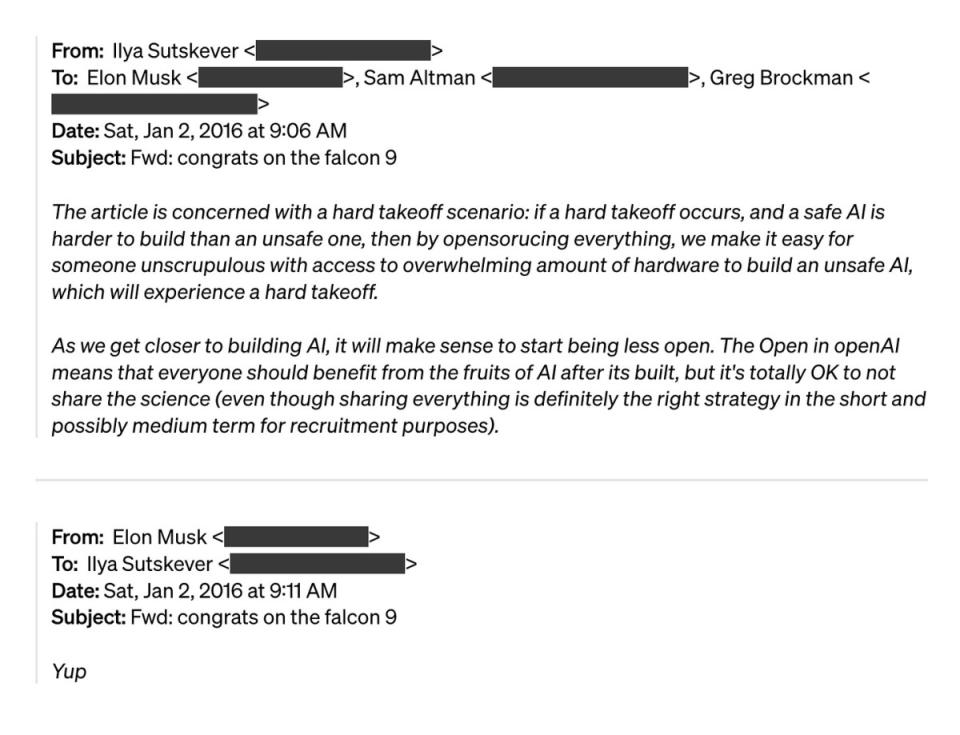After Elon Musk’s Lawsuit, No More Illusions About OpenAI
Elon Musk’s lawsuit against OpenAI may not succeed in court, but it’s already peeling away the mythology around the world’s leading AI research house.
The open part of OpenAI, we learned this week, was more of a recruiting tactic than a dedication to open source. And no matter how far its technology advances, OpenAI will always have an incentive to present its research as something close to artificial general intelligence, but not quite there.
Indeed, as the two parties exchange fire, Musk may well succeed in portraying OpenAI’s true nature as a for-profit, Microsoft subsidiary. All the while, the public will gain invaluable insights into OpenAI’s founding and evolution.
Here’s what we’ve learned so far:
OpenAI’s openness was mostly a recruiting tactic
In an attempt to rebut Musk’s argument that OpenAI betrayed its founding agreement, OpenAI leadership released an extraordinary internal email this week. On January 2, 2016, OpenAI chief scientist Ilya Sutskever wrote that open-sourcing its research wasn’t crucial to its mission, and indeed mostly a recruiting ploy.
“As we get closer to building AI, it will make sense to start being less open,” Sutskever wrote. “The Open in openAI means that everyone should benefit from the fruits of AI after its built, but it’s totally OK to not share the science (even though sharing everything is definitely the right strategy in the short and possibly medium term for recruitment purposes).”
Sutskever’s comments run contrary to OpenAI’s early public posturing as an open source shop (it is in the name, after all), and aren’t exactly in sync with the company’s’ founding document. “The resulting technology will benefit the public,” the document said, “and the corporation will seek to open source technology for the public benefit when applicable.”
OpenAI has since stopped open sourcing its biggest GPT models. That may be because it believes it’s close to building “AI” — or artificial general intelligence, in the context of Sutskever’s email — or because it’s using the cover of being ‘close’ to keep its research proprietary. And that is where things get tricky.
Microsoft muddies the founding agreement
A few years after the Sutskever email — which Musk agreed with, complicating his case — OpenAI inked a $10 billion investment deal with Microsoft that entitles the tech giant to a large share of OpenAI’s profits. But the deal only applies to OpenAI’s technology before it reaches artificial general intelligence.
OpenAI has now effectively boxed itself into a position where it must be close enough to AGI that it can’t share the research, but far enough away to keep delivering profits for Microsoft. Musk’s lawsuit claims OpenAI has reached AGI, a dubious argument, but it’s awkward either way. The case lays it out cleanly.
“Given Microsoft’s enormous financial interest in keeping the gate closed to the public, OpenAI, Inc.’s new captured, conflicted, and compliant Board will have every reason to delay ever making a finding that OpenAI has attained AGI,” the lawsuit says. “To the contrary, OpenAI’s attainment of AGI, like ‘Tomorrow’ in Annie, will always be a day away, ensuring that Microsoft will be licensed to OpenAI’s latest technology and the public will be shut out, precisely the opposite of the Founding Agreement.”
I asked Musk via email if pressing OpenAI to make admissions like those in Sutskever’s email, which would draw out the tension in the company’s position, would make bringing the case worth it. He did not reply by press time.
Musk vs. Google
One fascinating subplot in Musk’s case is his fear of Google’s AI motives, and his determination to balance it with OpenAI. “Deepmind is causing me extreme mental stress. If they win, it will be really bad news with their one mind to rule the world philosophy,” Musk said in an email to the OpenAI team in February 2016. The lawsuit also cites an apocryphal story of one Deepmind investor joking that shooting its CEO, Demis Hassabis, would be the best possible thing they could do for humanity, given dangers of AI.
Now, look a the landscape: Musk’s had a messy divorce with OpenAI, Google is building tech on-par with OpenAI (though not without its hiccups), and Musk is now building his own AI, Grok, that’s largely underwhelmed. In this context, a lawsuit is one option to bend the technology back in the direction Musk intended. And while it may not change reality, it could indeed reshape the narrative around his erstwhile partner.
The post After Elon Musk’s Lawsuit, No More Illusions About OpenAI appeared first on TheWrap.




